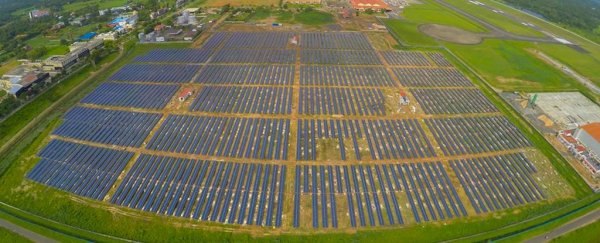Last year, we brought you news of the first airport in the world to run on 100 percent solar energy, and now Cochin International Airport in southern India has hit a major milestone: it's stopped paying for its electricity altogether, and actually contributes energy back to the grid thanks to the tens of thousands of solar panels spread across the site.
The first of those panels was installed three years ago, but it was only last year that Cochin Airport got serious about renewable energy, commissioning German firm Bosch to turn unused wasteland near one of the terminals into a huge solar power plant. Now that investment is finally starting to pay off.
"We wanted to be independent of the electricity utility grid," Jose Thomas, the airport's general manager, told CNNMoney. The airport uses 48,000-50,000 kilowatts of power every day, and the 45 acres of photovoltaic cells installed on the site can now take that strain and then some.There are now plans to extend the solar farm out even further to supply power to the larger international terminal currently under construction.
Other major players in the industry are taking note – the large swathes of unused land at most airports make them particularly suitable for projects of this kind. Indian Civil Aviation Minister, Ashok Gajapathi Raju, has visited Cochin and said he wants to use the same approach at other airports in the country, and representatives from Liberia and South Africa have also been to Cochin to check out the solar-powered airport in person.
Cochin is India's seventh busiest airport, but Kolkata International Airport, near the eastern border, is even busier, and it wants to build a similar solar plant covering 70 acres of land. If the plan goes through, it could see the airport reduce its energy bill by a third.
The innovations at Cochin and Kolkata have been helped by the growing economic viability of solar power in India - the price has now dropped to a similar level to coal, which makes it a genuine alternative on small and large scales.
Some estimations suggest solar energy will actually be cheaper than coal in India by 2020, and the Indian government is keen to bring more solar power into the grid as it looks to provide stable, round-the-clock electricity for its 1.3-billion population. In part, that's due to the environmental benefits of solar, which are particularly pertinent in a country that's home to 13 of the world's 20 most polluted cities.
As for Cochin International Airport, the site's management team thinks it'll soon be paying back some of the 620 million rupees (US$9.2 million) it cost to put the solar panel installations in place, thanks to the excess energy it's selling; and that's before you get to the 300,000 metric tonnes of carbon emissions it's estimated they'll save compared with coal power over the next 25 years.
Things are looking pretty great over at Cochin right now - rest of the world, take note.
